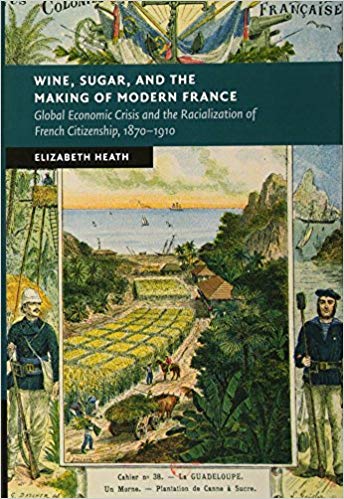 Global Economic Crisis and the Racialization of French Citizenship, 1870-1910
Global Economic Crisis and the Racialization of French Citizenship, 1870-1910
Author: Elizabeth Heath
Publisher: Cambridge University Press – 312 pages
Book Review by: Sonu Chandiram
This book is about political and economic events that took place in Aude, in the south of France, as well as in the French colony of Guadalupe in the Caribbean during the 40-year period (1870-1910) within the French Third Republic that lasted until 1940.
Here’s a brief recap of the political history of France from 1870 onwards: During the Franco-Prussian War of 1870-71, the Second French Empire that had been created by Napoleon Bonaparte III in 1852, collapsed. This was followed by the French Third Republic that existed until 1940, when Nazi Germany took control of France.
After 1940, during the course of World War II, there existed a civil administration known as Vichy France led by Marshal Philippe Petain. He was evacuated from Paris to Vichy in the unoccupied Free Zone in the southern part of France that included French Algeria.
During Second World War: the Second Armistice at Compiègne was put into effect after the French and British armies were heavily defeated in the Battle of France by the Germans. The northern half of France was occupied by German forces and the southern part was governed by the collaborationist Vichy Government that we mention briefly about in the above paragraph
The intriguing content of this book on race and different classes of citizenship is organized around three Parts and seven chapters that we list below.
Introduction: Of Wine and Sugar
- Part I.
- Wine, sugar and the global economy
- Defining republican citizenship on the peripheries
- Part II.
- Propertied elites and a new liberal citizenship
- Socialism and the rise of worker politics
- Smallholders and the promise of rural democracy
- Part III.
- Union member and citizen
- Defining French citizenship in a global age
Conclusion: Globalization, empire, and the making of modern France
Sandwiched between the chapters is an Introduction that begins with a 1908 letter from a self-described republican citizen and former slave named Andre Jenair to the French Minister of the Colonies decrying “the growing despair of rural citizens of color in Guadalupe.” and a Conclusion in that same letter from that same man to that minister, and his experience of historic events during the course of his life, that turned out to be positive and pleasant, including the:
- End of slavery
- Fall of the French Second Republic (Napoleon Bonaparte: 1848-1851)
- Rise of the French Third Republic that promised to grant full citizenship to all French men, black and white
This work of history written by Elizabeth Heath is described succinctly on the left flap of its jacket as ”an innovative study of how race and empire transformed French republican citizenship in the early Third Republic. Elizabeth Heath integrates the histories of the wine-producing department of Aude and the sugar-producing of Guadalupe to reveal the ways in which empire was integral to the Third Republic’s ability to stabilize a republican regime that began to unravel in the age of economic globalization”
The author discusses, among many issues and concerns, how:
- Global economic factors influenced discussions between local citizens on the one hand, and administrators and leaders of the Third Republic, on the other
- Responsibilities of the Republic led to the creation of two unequal and different forms of citizenship that became constitutive of the interwar imperial nation-state and the French welfare state
- Tensions within republicanism between the ideals of liberty and equality and on the construction of race as a meaningful social category at a foundational moment in French history
Among other events covered and discussed in this book are the
- Sugar Crisis of 1884 – an economic panic that depleted gold reserves in much of Europe and prompted New York City banks, with the approval of the US Treasury, to call in outstanding loans before their due date
- Meline Traiff of 1892 – a French protectionist measure that has been suggested that it was a reflection of an emerging industrial bourgeoisie, big landowners and peasant farmers. It was named after Jules Meline, the sixty-fifth 65 Prime Minister of France
As recently as 2009 the author points out at the end of this book, Guadalupeans had not overcome the status of ‘colonial citizens’ and had violent demonstrations and protests, demanding higher wages.
This is really an eye-opener of a book that you can learn a lot from, on matters pertaining to economic colonialism, citizenship and its various forms and classes, and important French historical events during the late nineteenth century and early twentieth century.
Editor:
Elizabeth Heath is Professor of History at Baruch College, City University of New York, in New York, New York.







